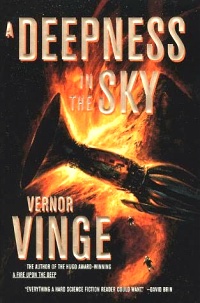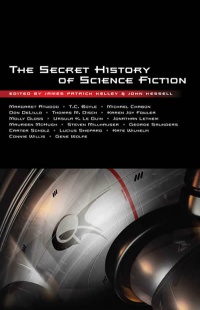The Qeng Ho fleet was the first to arrive at the OnOff star. That might not matter. For the last fifty years of their voyage, they had watched the torch-plumes of the Emergent fleet as it decelerated toward the same destination.
This was a situation where treachery might be rewarded, and both sides knew it.
Title: A Deepness in the Sky
Author: Vernor Vinge
Year: 1999
Rating: 5/5 stars
 This novel is set in the same universe (the “Zones of Thought”) as Vinge’s A Fire Upon the Deep, and although it’s not necessary to have read that previous novel in order to appreciate this one, that is still the easiest angle of approach, so that’s where I’ll start (and hey, you should read them both anyway, since they’re both fantastic). In Fire we meet the character of Pham Nuwen, who is actually a sophisticated recreation of the original Pham Nuwen, constructed by one of the super-advanced Powers from the Beyond. This artificial being has the personality and memories of the actual living Nuwen, and throughout the book we get tantalizing glimpses into his long-ago life as part of the Qeng Ho trading culture in the Slow Zone. A Deepness in the Sky takes us back to that time, some twenty thousand years earlier, and lets us share some of the exploits of the real Pham Nuwen. And once again, Vinge scores a hit, delivering a modern space opera classic.
This novel is set in the same universe (the “Zones of Thought”) as Vinge’s A Fire Upon the Deep, and although it’s not necessary to have read that previous novel in order to appreciate this one, that is still the easiest angle of approach, so that’s where I’ll start (and hey, you should read them both anyway, since they’re both fantastic). In Fire we meet the character of Pham Nuwen, who is actually a sophisticated recreation of the original Pham Nuwen, constructed by one of the super-advanced Powers from the Beyond. This artificial being has the personality and memories of the actual living Nuwen, and throughout the book we get tantalizing glimpses into his long-ago life as part of the Qeng Ho trading culture in the Slow Zone. A Deepness in the Sky takes us back to that time, some twenty thousand years earlier, and lets us share some of the exploits of the real Pham Nuwen. And once again, Vinge scores a hit, delivering a modern space opera classic.
As the story opens, Nuwen is in hiding after being betrayed and toppled from his position of power many years ago, just when he was on the brink of achieving his greatest dream — the dream of a network capable of holding humanity together throughout the galaxy without the periodic dark ages it has been accustomed to. Now, after a long and massive search, one of his former captains has tracked him down, and convinces him to join an expedition that offers unique and unprecedented opportunities for profit. Astronomers had long known of the OnOff star, a mysterious stellar object that goes dark for 215 out of every 250 years, but no one had ever investigated up close. But it has suddenly become urgent, since radio signals have been picked up from a planet orbiting OnOff — signals suggesting the world is home to the first alien species ever discovered by humanity.
But the Qeng Ho are not the only ones to recognize the opportunities of the situation. Another of humanity’s countless long-separated branches happens to dwell near enough to send an expedition. The Emergents, as they call themselves, see OnOff and the alien civilization there differently than the Qeng Ho — as a resource to be ruthlessly exploited, rather than as a potential trading partner. The rigidly authoritarian and dictatorial Emergent culture is the antithesis of the libertarian, free-market-loving Qeng Ho, and as the two race toward their common destination, a clash of civilizations is inevitable. But the Emergents have a secret weapon to use in that clash: a certain virus found on their homeworld, tamed over centuries, that has profound effects on the human brain. In a weaponized form called “mindrot” it is a crippling disease that shuts down higher mental functions. In a different form called “Focus,” it’s a tool for turning a human being into a living computer. The Focused are like idiot savants, concentrating their entire mental life on their one specialty (navigation, translation, physics, or whatever) with nothing left over for anything else, even simple human interaction. These genius zombies are loyal to their creators (without enough individual will to resist), and are the backbone of Emergent power. And even as the Qeng Ho face the most ruthless adversaries they’ve ever met, Nuwen faces a temptation: is Focus the answer to his long-held dream of a unified human galaxy?
But there’s more going on here. Just as its companion novel does, A Deepness in the Sky tells half of its story from the perspective of an alien species. The Spiders (so called by the Qeng Ho for their general arachnid appearance) have a unique culture shaped by the unusual circumstances of their environment. On a planet that only gets significant sunlight for 35 out of every 250 years, survival through the Long Dark is paramount. While the world goes cold and the atmosphere itself freezes and snows to the ground, the Spiders hibernate in their deepnesses (caverns dug in the ground) awaiting the next cycle of light and warmth, when their society will flourish again. Or, I should say, societies; for the Spiders are split into different nations and factions with a range of social and political beliefs, and a willingness to wage war for them. Just as the humans in space above battle over their various ideals, so it goes for the Spiders below. Those two arenas of conflict, and their interactions and resolutions, are what this novel is all about.
The book is full of familiar human issues (freedom vs. authoritarianism, liberalism vs. conservatism, Big Brother-style surveillance, the costs and benefits of progress) played out in another part of the galaxy, and played out very well. From the machinations of the Emergents, to the history of Nuwen and the Qeng Ho, to the mystery of the OnOff star itself, every part of this book makes for an intensely satisfying read. Vinge is one of the best at this sort of novel, and I really hope he writes more in this universe, since the ending left me eager for more.

 I have read several of Vernor Vinge’s novels and found their quality to range anywhere from “good” to “outstanding.” Indeed, over the time period I read those books, I’ve come to regard him as a solid and reliable author, perhaps even a growing favorite. So it seemed like a no-brainer to get this 2001 volume, The Collected Stories of Vernor Vinge, containing nearly every story he had published up to that time. After all, if he’s that great a writer, how could I go wrong? Surely there must be some decent stories, and maybe some real gems, residing inside this 464-page tome of tales, right? Well, umm, as it turns out…… no, not really. I honestly can’t think of another story collection or anthology that I was more thoroughly unimpressed with than this one. And I take no pleasure in saying this, believe me.
I have read several of Vernor Vinge’s novels and found their quality to range anywhere from “good” to “outstanding.” Indeed, over the time period I read those books, I’ve come to regard him as a solid and reliable author, perhaps even a growing favorite. So it seemed like a no-brainer to get this 2001 volume, The Collected Stories of Vernor Vinge, containing nearly every story he had published up to that time. After all, if he’s that great a writer, how could I go wrong? Surely there must be some decent stories, and maybe some real gems, residing inside this 464-page tome of tales, right? Well, umm, as it turns out…… no, not really. I honestly can’t think of another story collection or anthology that I was more thoroughly unimpressed with than this one. And I take no pleasure in saying this, believe me.













